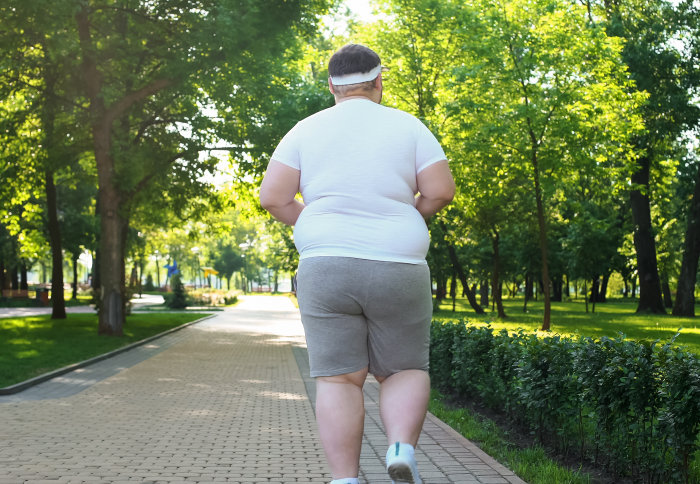Being male or overweight can lead to more serious COVID-19 hospital admissions

New UK research has found that being male or obese reduces chance of survival from severe coronavirus disease (COVID-19).
The findings come from a study of almost 17,000 patients with COVID-19, in which researchers from three universities, including Imperial, aim to answer important questions about the course of and risk factors for the disease.
According to the Department of Health and Social Care, COVID-19 can be more severe in older people and people with chronic heart, lung, and kidney disease, a weakened immune system, diabetes, and some cancers. However, less is known about how the virus exploits age, sex and other underlying health conditions.
This study is quite amazing in that it was launched with such speed and collected so much data. Our research provides an exceptional picture of the illness and risk factors and will underpin a huge range of research. Professor Peter Openshaw
In an effort to better understand who is most severely affected by the virus, what happens to them in hospital and why some people have better outcomes than others, ISARIC4C, a consortium of researchers from Imperial College London, the University of Liverpool, and the University of Edinburgh, analysed data obtained from 16,749 COVID-19 patients in the UK.
The researchers have found that after adjusting for other medical problems such as lung, heart and kidney disease that are already known to cause poor outcomes, being male or obese (with a BMI over 30) is a significant factor associated with death in UK hospitals, a feature not seen in China, where it is thought that fewer people are obese.
Although the reasons for why obese people are suffering such severe COVID-19 and dying more than other groups are not clear, the researchers believe it could be because they have reduced lung function and possibly more inflammation in adipose tissue – the fatty tissue under the skin and around internal organs.
According to the researchers, this might contribute to an enhanced ‘cytokine storm’ – a potentially life-threatening overreaction of the body’s immune reaction which causes harm.
Largest study outside China
The analysis is based on information obtained by more than 2,500 research nurses and medical students from 166 UK hospitals. It is the largest study of its kind outside of China, where this coronavirus first emerged. The results of the study have already been shared with UK Government and the World Health Organization and are being compared with data from other countries around the world.
Professor Peter Openshaw, from the National Heart & Lung Institute at Imperial, said: “This study is quite amazing in that it was launched with such speed and collected so much data. It highlights several crucial questions which researchers, healthcare professionals, the public and patients need answers to. Our research provides an exceptional picture of the illness and risk factors and will underpin a huge range of research.”
The study is being led by Professor Kenneth Baillie at Edinburgh University, Professor Calum Semple at Liverpool University and Professor Peter Openshaw at Imperial College London. The analysis that found the relationship between sex, obesity and poor outcome was done by Dr Annemarie Docherty and Professor Ewen Harrison at Edinburgh University.
Everything humanly possible to understand the disease
Hard data cannot convey the human story of individuals and their loved ones who have suffered, changed or sadly passed due to COVID-19. Yet with every contribution to this important study, patients and their carers, with the assistance of dedicated researchers, have struck a blow in the fight to curb this pandemic. Dr Annemarie Docherty
Professor Calum Semple, from the University of Liverpool, said: "One in three people admitted to hospital with of COVID-19 in the UK have contributed to this vital research. The contribution of UK patients in such tragic circumstances been critical to improving the global understanding of this terrible disease. We must do everything humanly possible to understand this disease, so that we are better prepared for the next wave of this pandemic.”
Dr Annemarie Docherty, from the University of Edinburgh, said: “Hard data cannot convey the human story of individuals and their loved ones who have suffered, changed or sadly passed due to COVID-19. Yet with every contribution to this important study, patients and their carers, with the assistance of dedicated researchers, have struck a blow in the fight to curb this pandemic.”
Professor Openshaw added: “We really appreciate the huge effort that so many people made to send in clinical information and collect samples. It is salutatory to recognise that people risked their lives to collect material for this study. We thank them all as well as the funders, the patients and their relatives, and promise that we will do all we can to find ways to fight the disease.”
Dr Kenneth Baillie, from the University of Edinburgh, said: "There are some things that the UK does very well - working together is one of them, particularly in healthcare. Gathering this information took tremendous dedication and effort from thousands of research staff across the UK. Together they have created an open resource that will be used by scientists across the world to better understand this new disease."
ISARIC4C is funded by a grant from UKRI (MRC).
-
A preprint of the paper, entitled ‘Features of 16,749 hospitalised UK patients with COVID-19 using the ISARIC WHO Clinical Characterisation Protocol’, is available through the preprint server medRxiv and will soon be published.
-
Based on a press release by the University of Liverpool.
Article supporters
Article text (excluding photos or graphics) © Imperial College London.
Photos and graphics subject to third party copyright used with permission or © Imperial College London.
Reporter
Hayley Dunning
Communications Division